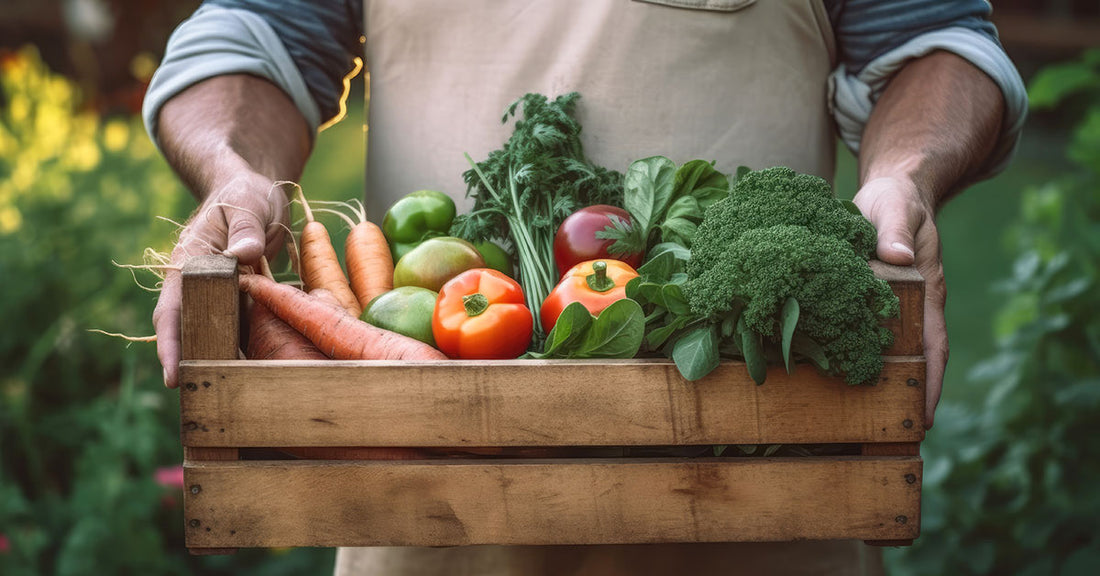Approximately three out of five adults say they feel more tired now than ever before.
Does this sound familiar? Do you catch yourself dragging your feet in the morning or nodding off at your desk halfway through the workday?
One of the best ways to increase your energy naturally is by eating more vegetables and adding more nutrients to your meals.
Below, you’ll learn how veggies can power up your energy levels, as well as the best vegetables to add to your diet for maximum energy.
Nutrients That Increase Energy
Eating more vegetables will provide you with essential micronutrients that can increase your energy (without the crash that comes from caffeine or sugar). The following are some of the nutrients that are best known for their energy-boosting properties:
B Vitamins
B vitamins are water-soluble vitamins that help the body create and get energy from food. Here’s a quick breakdown of the B vitamins and their benefits:
- Vitamin B1 (Thiamin): Facilitates glucose processing (glucose is the body’s primary energy source) and aids in neurotransmitter (chemical messenger) production.
- Vitamin B2 (Riboflavin): Helps with glucose processing.
- Vitamin B3 (Niacin): Aids in releasing energy in the body from carbohydrates, protein, and fat.
- Vitamin B6 (Pyridoxine): Assists in neurotransmitter production, especially neurotransmitters associated with memory and cognitive performance.
- Vitamin B9 (Folate): Needed for protein and amino acid (the building blocks of protein) metabolism
- Vitamin B12 (Cobalamin): Maintains the outer coating of the nerve cells and aids in memory
All of the B vitamins also work together to provide energy and assist in DNA production and protein synthesis.
Vitamin A
Vitamin A is a fat-soluble vitamin that influences the hippocampus (a part of the brain associated with memory) and aids in cognitive function.
Vitamin C
Vitamin C is a water-soluble vitamin that transforms the neurotransmitter dopamine into noradrenaline (also known as norepinephrine). Noradrenaline is essential for arousal, attention, cognitive function, and reaction during stressful situations.
Vitamin E
Vitamin E is fat-soluble and a beneficial antioxidant. Antioxidants neutralize free radicals, compounds that cause cellular damage. Vitamin E supports red blood cells, which carry oxygen to the lungs, blood, and throughout the body.
Selenium
Selenium is a mineral that contributes to healthy metabolism and the ability to convert food into energy. It also supports thyroid health. If your thyroid isn’t functioning correctly, you may experience increased fatigue and sluggishness.
Copper
Like many of the other nutrients listed above, the mineral copper aids in energy production. It also supports neurotransmitter synthesis.
Zinc
Zinc is a mineral that plays a vital role in various enzyme-powered chemical processes. These processes include those required for breaking food down so it can be used for energy and proper immune system function.
Magnesium
Magnesium is needed for over 300 different bodily processes.
This mineral helps with neurotransmitter release, new brain cell connections, and proper cognitive function. It also improves sleep quality so you can wake up rested and refreshed in the morning.
Manganese
Manganese is a mineral that helps with the utilization of numerous vitamins, including vitamins C and E. It assists with proper liver function, energy production, and brain activity regulation, too.
Best Veggies for Energy
As you can see, lots of different nutrients can enhance your energy and help you feel more alert and focused. Where do you get all these nutrients, though?
The following are some of the most nutrient-dense vegetables to add to your diet:
Sweet Potatoes
Sweet potatoes are an excellent source of many of the nutrients listed above, including vitamin A, B vitamins, vitamin C, magnesium, thiamin, and zinc.
Along with all of these vitamins and minerals, sweet potatoes also provide you with fiber and complex carbohydrates.
Fiber helps to slow down the processing of carbohydrates, which contributes to feelings of fullness and allows for sustained energy throughout the day. It doesn’t deliver a quick spike of energy followed by a crash, which typically happens after eating simple carbohydrates (like those in processed, high-sugar foods).
Beets
Beets provide you with folate, manganese, and vitamin C, as well as many antioxidants that protect the cells from free radicals. Beet greens, specifically, are also a good source of vitamin E.
When you eat beets, in addition to various nutrients, you get a healthy serving of complex carbohydrates and fiber, meaning you’ll enjoy longer-lasting energy.
Dark Leafy Greens
Dark leafy greens like kale, collard greens, and spinach are low in calories but loaded with nutrients.
Many dark leafy greens are good sources of vitamin C, as well as copper, folate, zinc, and antioxidants. Adding more greens to your diet will also add volume to your meals and provide you with extra fiber, both of which help with feeling fuller.
Broccoli
Broccoli is another low-calorie and nutrient-dense vegetable to enjoy if you want more energy.
Broccoli contains more vitamin C per serving than an orange! It also contains folate, selenium, zinc, manganese, and fiber for fullness and long-lasting energy.
Asparagus
Asparagus contains vitamin A, vitamin C, and folate, all of which are vitamins that can help you feel more energized. This low-calorie vegetable also contains fiber to help you feel fuller and more satisfied after your meal.
Carrots
Carrots provide you with several B vitamins, specifically vitamin B3 (niacin) and vitamin B6 (pyridoxine). They also contain vitamin C and beneficial antioxidants like beta-carotene.
Some people are hesitant about eating carrots because they are higher in sugar than many other vegetables. However, the amount of sugar is still relatively low. Carrots contain fiber, too, which helps to offset the effects of sugar.
Get an Energy Boost with Nature’s Sustenance
Eating more vegetables is an excellent way to increase your energy levels naturally. Eating all the vegetables listed above every day can be challenging, though.
That’s where Nature’s Sustenance comes in.
Nature’s Sustenance capsules contain over 20 fruits, vegetables, and greens that give your body the nutrients it needs to function properly. They are also vegan-friendly, non-GMO, and made in the United States.

